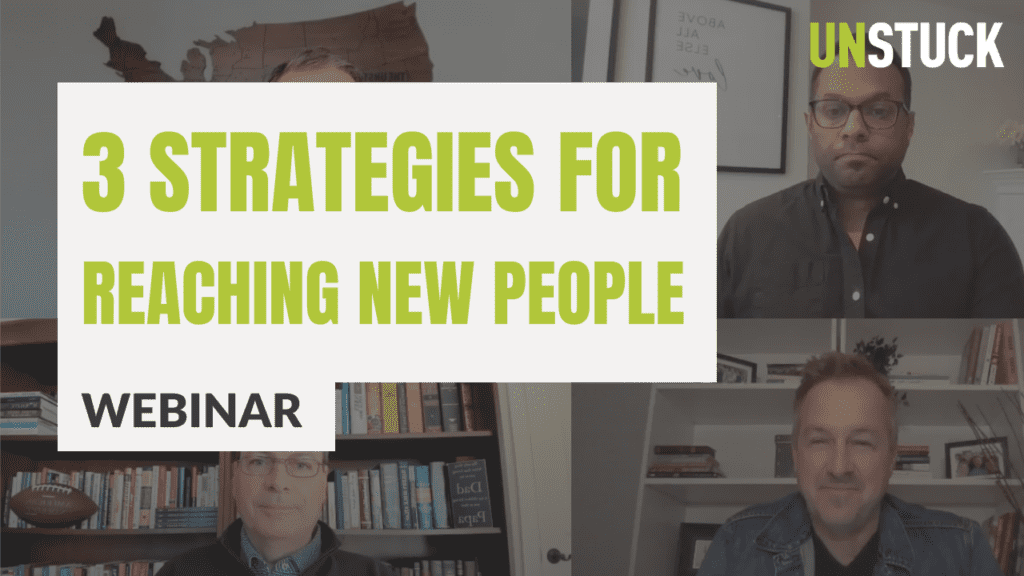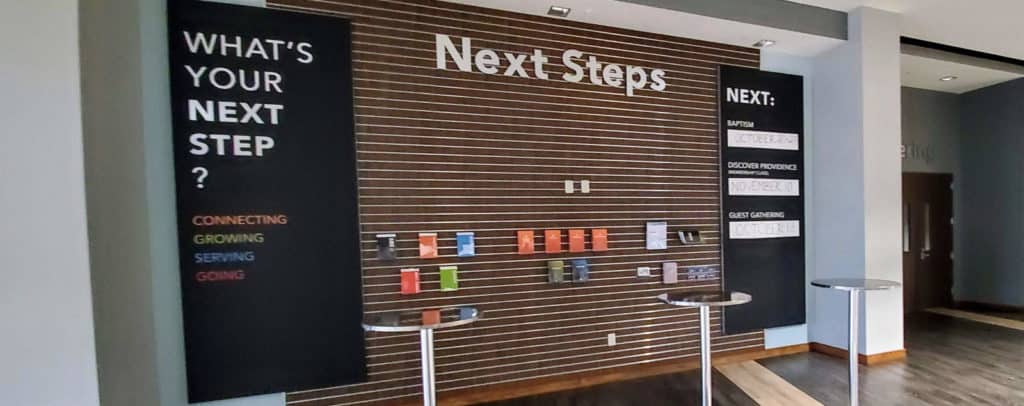Reaching New People (Part 3)
If you enjoy this episode, subscribe on your device for more:
iTunes RSS Stitcher Spotify
“A highly engaging and compelling message is a non-negotiable. But great teaching alone will not accomplish what you are trying to do.”
In Part 1 of our series on Reaching New People, Amy Anderson and I sat down with Chad Moore and Paul Alexander from Sun Valley Community Church to discuss the uncommon results they’ve been seeing in their efforts to reach new people. Then in Part 2, Amy and Sean talked through some incredibly practical steps for helping your church reach outward using digital strategies, provided by Katie Allred from Church Communications.
In the final part of our series, we’re exploring all the ways churches can maximize their weekend service experiences to reach new people.
REACHING NEW PEOPLE: WEEKEND SERVICES
In part one of this episode on reaching new people through weekend services, I sat down with Amy and Sean Bublitz, Ministry Consultant for The Unstuck Group, to unpack some “Secret Shopper” assessment data from our time in churches across the country and give practical advice from the churches who are winning on the weekends. Our Secret Shopper assessments rate churches based on six components of their weekend service experience: website, facilities, guest services, kids ministry, worship experience, and message.
While it’s certainly a combination of these that differentiates churches who are reaching more new people and those that are not, some make a bigger difference than others. In the second part of this episode, Sean, Amy, and I are revealing the two most important differentiators for growing churches, and giving more practical tips for improving your weekend experiences.
- More insights from our Secret Shopper assessments
- The number one differentiator for growing churches (hint: it’s not your sermon)
- A compelling case for better kids ministry
- 4 tips for improving your guest services
EVENT REPLAY: 3 Strategies for Reaching New People
Rather than focusing on who left, we need to get refocused on the true mission of the Church: reaching the lost people in our communities. In this free webinar, hear from leading church voices Dave Ferguson, Chris Hodges, and Jerry Sen and continue this conversation on how you can reach new people in 2022 using practical strategies.
Leader Conversation Guide
Want to take this conversation back to a staff or senior leadership team meeting?
Our Show Notes subscribers get a PDF download that recaps the episode content and includes a discussion guide you can print out and use at an upcoming meeting.
Opt-in here and get the Leader Conversation Guide for this episode, as well as access to the archive.
Share Your Thoughts and Questions on Social Media
We use #unstuckchurch on Twitter, and we start a real-time conversation each Wednesday morning when the episode drops. You can follow me @tonymorganlive and The Unstuck Group @unstuckgroup. If Facebook is where you spend your time, I’m there, too.
Write a Review—It Helps!
Particularly on iTunes, your ratings and reviews really do help more pastors discover the podcast content I’m creating here. Would you take a minute to share your thoughts? Just open the the podcast on iTunes on your phone or computer, click Ratings & Reviews, and leave your opinion.
Transcript
Sean (00:02):
Welcome to The Unstuck Church Podcast, where each week we’re exploring what it means to be an unstuck church. My name is Sean, and I’m your host. And on this episode, we’re continuing our series of podcasts on reaching new people. Today, Tony, Amy and I wrap up our conversation on how churches are reaching new people through their weekend services this side of the pandemic. But before we go there, if you’re new to the podcast, I want to invite you to head over to theunstuckgroup.com/podcast and subscribe to get the show notes each week in your email. When you do, you’ll get resources to go along with that week’s episode, including the leader conversation guide, our bonus resources and then access to our podcast resource archive. Again, that is theunstuckgroup.com/podcast to subscribe. So Tony, on last week’s episode, we talked a lot about the worship service, including the message specifically, but if part of the goal is reaching new people, it sounds like you’re finding in the data that there are other really significant areas that churches need to focus on in order to reach new people. So can you explain to us what you’re learning from the data?
Tony (01:06):
Yeah. You know, Amy mentioned earlier there are these six areas that we look at around the whole weekend service experience: kind of the pre-visit experience, and obviously our web strategy helps with that. The facilities themselves, the guest services experience, so for people, when they’re coming on to our campuses and coming into our buildings, what is that experience like? The children’s ministry environments, the worship experience, and then the message itself. And no doubt, the combination of all of these is what differentiates those churches who are reaching more new people and those that are not. But the strongest correlation between reaching more new people and those six components of the weekend service experience is actually with the guest services experience. And then following in second place, what the data shows is there’s also a strong correlation with the kids ministry program and environments, when it comes to reaching new people specifically. And though there was correlation certainly between the quality and intentionality of all six components. The teaching was actually number five on the list and number six was facilities. So again, I don’t want you to ignore the importance of teaching a message that both connects with new people and also helps believers take their next steps toward Christ. But it’s possible that, you know, some of these other areas are just as important to reaching first-time guests. And I’m guessing that many pastors are probably glad to hear that the facilities appear to be the least important factor when it comes to reaching new people. But I’m also guessing many pastors are probably a bit surprised that the message isn’t as high as maybe guest services and kids ministry when it comes to reaching new people. And I hope you’re not discouraged by that, rather I hope you see the opportunity in this. You should certainly continue to teach the truth of scripture while encouraging people to apply that truth to their lives. However, I think it’s great that all the elements of a Sunday morning, including the guest services experience, appear to have a great impact on a church reaching new people. After all, that guest services, as an example, it may be the easiest part of the Sunday service experience that any church of any size can improve. And again, that’s closely followed by the kids ministry environment, and Sean and Amy, this isn’t the first time, by the way, that our research has found a link between kids ministry and churches that are reaching more new people and experiencing growth. I don’t think we can ignore the opportunity around this, particularly if your church is trying to reach young adults. So let me put this as bluntly maybe as I can say it, our research through the years has confirmed that healthy growing churches prioritize kids ministry over youth ministry, though you should still continue to provide ministry to middle schoolers and high schoolers. Kids ministry is very important, especially again, to reaching young adults. And healthy growing churches also prioritize kids ministry over adult Sunday school, as an example, though, again, you should still have a discipleship strategy to help adults become more like Jesus. But unfortunately, what I’ve seen happen too many times is that adult Sunday school, as an example, often competes with the kids’ ministry space, the kids’ ministry volunteers, and the leaders we need for children’s ministry to disciple our kids on Sunday morning. So with all that, Amy, does it surprise you that guest services and kids ministry are so important to reaching new people?
Amy (05:12):
Well, I would say I think a highly engaging, compelling message and weekend experience certainly is a nonnegotiable, right? If that’s not not buttoned up, you can have the best greeters and the best kids ministry and still not retain people. But what you’ve just made a compelling case for is a great weekend experience and teaching alone is not going to be “the all” for reaching people. You have to have healthy guest services and kids ministries. I’ll give you an example of what you were just saying about, I’ve worked with all kind of churches, but one church I worked with, that was stuck and maybe even reaching towards life support on the church life cycle, they had rooms in their building that were for adults that kids borrowed on the weekend. Can you imagine how boring those rooms are? Okay. The church I just worked with last weekend – great church, healthy church. They’re asking all the right questions. They are using kids rooms for their adult space when they need to have adult meetings. That’s an example of two churches having the same problem, we don’t have enough space, but one’s investing in kids spaces that adults can use. The other one’s investing in adult spaces that kids can use. Big difference.
Sean (06:25):
So, Tony, like we mentioned at the beginning of the podcast, I talk with pastors from all over the country. And one of the things that comes up most often is that they’re struggling to reach younger adults. And they’re trying to think through strategies to do that. Would you say that our data is pointing to the fact that maybe kids ministry would be even more important to them to reaching younger people, younger adults than the service, a contemporary service, the style of service maybe?
Tony (06:51):
Yeah, there’s no doubt about it. And if you think about it, just put yourselves, I mean, many of you were once young adults with young kids, and how many of you were willing to sacrifice your preferences, your time, your financial resources to help your kids experience success in life, including in their spiritual journey. And so the churches that prioritize this, they’re the ones that are actually reaching the young adults. It’s interesting. The churches that program specifically to young adults sometimes have challenge reaching young adults. And I think one of the reasons why is they’re not considering what’s the most important need that that young adult has right now in their life. And frankly, for many young adults, it’s about their family, their kids. Sean, since guest services impact our effort to reach new people in such a significant way, are there any best practices you’ve encountered as you’ve done some of these secret shopper experiences through the years?
Sean (07:52):
Yeah. Yeah, absolutely. Here’s a few. So churches who are great at this, they’re really intentional about building teams of volunteers that are gonna help people from the parking lot, the first time they pull into the church, to the front door, to the kids check-in, to the auditorium. I mean, these teams are creating a personalized, we care about you kind of experience that can make a very foreign environment. I mean, if you haven’t gone through the exercise to walk into a church that you’ve never been in for the first time, if you haven’t done that in a long time, I’d encourage you to take a Sunday off and do it. People are walking into a foreign environment for the very first time. And in some contexts, they’re walking into a really big church. These intentional teams, these volunteer teams, are making that experience feel smaller and feel more personal. So that that’s really key. I mentioned this earlier with City Church in Fort Wayne that we worked with, but the team that people are seeing as they interact with the church for the first time reflects the person that they’re trying to reach. It reflects their community. So interestingly, pastor Lee Kricher, he led a revitalization at Amplify Church. He actually used this strategy. He said, “75% of everybody who serves in a public volunteering position or in a staff position, they’re going to be at the average age of the community or lower.” So that was the strategy they used to specifically kind of represent their mission field and who they were trying to reach. The third thing I’d say, the guest service volunteers are prepared to answer questions, key questions, like how do I get help? How do I meet other people here at this church? How do I take my next step? What is my next step? New people will have no idea that these guest service volunteers they’re interacting with are just volunteers. All that they know is they represent your church. And if your volunteers are on unclear on the basics, that’s going to be an immediate red flag for those new people connecting with your church. The last thing I’d say is, and this is kind of important, it seems maybe a little bit different, but it’s important. Everyone is wearing the same uniform, so specifically t-shirts, not name badges. Okay. It needs to be overly obvious for new people that they know who they can ask if they have questions or need directions. So think about it this way. If you’re at Home Depot and you have questions, you find the person wearing orange, right? If you’re at Target and you have questions, you find the person wearing red, right? The same concept in our church, but here’s a pro tip for you. I’ll leave you with this. If you want to have some fun, wear an orange apron and a name tag and go to Home Depot and see how long it takes them to figure out you don’t actually work there.
Amy (10:42):
I actually experienced what you just went through, Sean, this past weekend. I would call it a best practice. So I always get nervous when I do secret shoppers, because number one, I have a terrible time lying, but I have to be ready to answer their questions. So I haven’t been on the road really since early December. So I was back in it this weekend, Tony, and I walked up. You know, I parked my car, walked up to where the church was and went through the doors where the coffee shop was and just kind of looked around, and I’ll just call him, I’ll call him Mark. Mark found me. And he’s like, Hey, can I help you find something? I’m like, oh, I’m just gonna get some coffee. Anyways, he found out I was new, and he did it so well, such high EQ. And then he introduced me to his wife, and then he encouraged me to stop by the I’m new tent, which was out the door. Which of course I wasn’t gonna do because I’m already nervous as a new person. I don’t wanna go to where it says I’m new. But I said, okay, I got my coffee and took a step outside and was about to take a left, to go to where the worship center was. And he was like, oh, Hey, I’ll walk you over there. So he like snuck up behind me, in a good way, and walked me over to the I’m new tent where he introduced me to the two gals who were serving there. They were great. One of ’em even said, Hey, I’ll walk you in the worship center. I’ll help you find a seat, you know, guided me in there. And again, it was just great EQ. They were such friendly people. They didn’t over ask me too many questions. They had on the same uniform, Sean. So I knew they were all part of the same team. Then they gave me a bag that had some great print pieces in it that answered all the top questions I had. So as I sat in that service, waiting for it to start, I started looking through it. It told me about kids. It told me about students. It told me about next steps, and it was just a great experience. And by the way, the teaching was great. And so I got to tell that church, I would actually come back, and it was the guest services and the message that really drew me to come back to that church.
Tony (12:39):
That’s awesome. That’s a great story. You kind of lost me after you said, though, I’m not good at lying because I was thinking we have a great hiring practice at The Unstuck Group because we try to avoid people that are good at lying. So apparently that hiring process worked when we got you on the team. Amy, I’m glad to hear that.
Amy (12:57):
I can’t tell you how much time I spend looking at the various school names around these churches I secret shop in case someone asks me where my kids go to school. So… Well, Tony, I hope our listeners have enjoyed this. I love this topic, but do you have any final thoughts before we wrap up today’s conversation?
Tony (13:16):
Yeah. I mean, first of all, just Sean, Amy, thank you for joining me for this discussion. And thank you for being a part of our team. We should probably do this more often with the three of us together on this. But secondly, we talked a lot about our secret shopper experience in today’s episode. And as I mentioned earlier, that secret shopper experience is something we do for every church that goes through the full Unstuck process. So if you’re curious to know how first-time guests perceive your Sunday services, you might wanna reach out to us to learn more about that. And here’s the good news. You’ll get to talk to Sean when you do that. So he’d love to talk with you more about how we engage with churches to help you get a better perspective of what’s happening on Sundays at your church as well.
Sean (14:04):
Absolutely, Tony, I would love to have a conversation with any leaders out there who’d like this kind of help and perspective on their ministry. Just reach out to us. Go to theunstuckgroup.com/start, and we can start a conversation. If this week’s podcast or any of our past podcasts have been helpful for you, we’d love your help in getting the content out further. And you can do that by subscribing on your favorite podcasting platform, giving us a review there and telling somebody else about the podcast. Next week, we’re back with another brand new episode. So until then, have a great week.









Leave a Reply